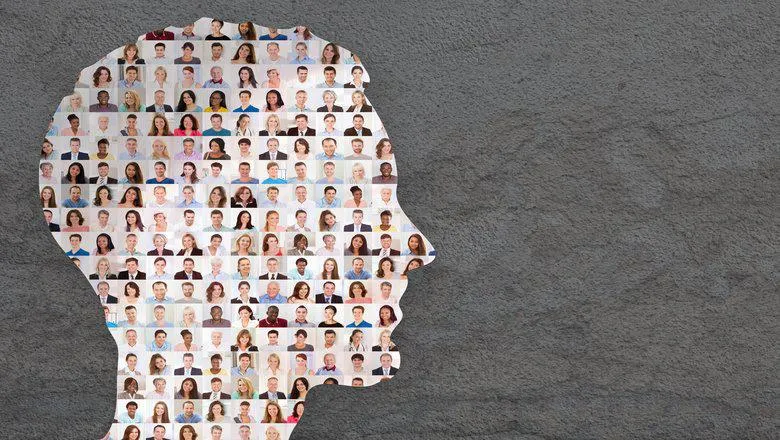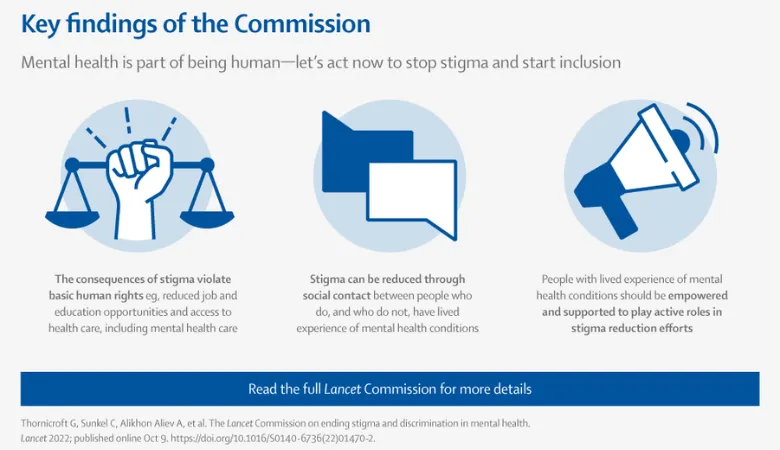Many people with lived experience of mental health conditions describe stigma as ‘worse than the condition itself’. There is clear evidence that we now know how to effectively reduce, and ultimately eliminate, stigma and discrimination. Our Commission makes eight practical, evidence-based and radical recommendations for action to liberate millions of people around the world from social isolation, discrimination and violations of human rights caused by stigma.
Commission Co-Chair Professor Sir Graham Thornicroft, Professor of Community Psychiatry at the Centre for Global Mental Health at the IoPPN.
10 October 2022
The Lancet Commission on Ending Stigma and Discrimination in Mental Health
Experts call for radical global action to end stigma and discrimination against people with mental health conditions, as this is often ‘worse than the condition itself’. The new Lancet Commission on Ending Stigma and Discrimination in Mental Health, co-chaired by Professor Sir Graham Thornicroft, is the result of work by over 50 experts, including experts by experience from across the world. The report finds that people with lived experience of mental health conditions must be empowered and supported to play active an central roles in stigma reduction efforts.

In a comprehensive review of the evidence for effective stigma reduction interventions, the report also finds that social contact between people with and without lived experience of mental health conditions is the most effective way to reduce stigma and discrimination.
Recent estimates suggest one in eight people, nearly one billion people globally, are living with a mental health condition. The COVID- 19 pandemic helped to put a spotlight on the urgent mental health situation globally with an estimated 25% rise in the prevalence of depression and anxiety in the first year of the pandemic. The researchers say that, with the global rise in rates of mental illness since the pandemic, there is an even greater need to act now.
The Commission finds that people with mental health conditions experience a double threat: the impact of the condition itself and the damaging consequences of stigma and discrimination. Mental health-related stigma and discrimination are widespread globally and violate basic human rights by leading to exclusion of individuals from society. Social injustices, such as problems in accessing healthcare, including mental health care, increased likelihood of health complications leading to early death, and challenges in gaining employment, are all adversely related to stigma.
Our Commission … shows that anti-stigma interventions around the world are most effective when they directly involve people with lived experience in all aspects of their production. We must put the voices of people with lived experience of mental health problems centre stage.
Dr Petr Winkler, Director of the WHO Collaborating Center for Public Mental Health Research and Service Development, Prague, Czech Republic.

The report argues that people with lived experience of mental health conditions must be empowered and supported to play central and active roles in stigma reduction efforts. For this reason, the Commission has made a point to include the voices of people with lived experiences in the form of poems, testimonies, and quotations to fully demonstrate the toll stigma and discrimination take.
Experts call for immediate, radical action from governments, international organisations, employers, schools, healthcare providers and media organisations. The Commission calls on all governments to implement anti-stigma policies, international organisations to issue guidance including decriminalising suicide, schools to adapt their curricula, employers to promote full access to educational opportunities, work participation and return-to-work programmes, pre-qualifying training courses for all health and social care staff to include mandatory anit-stigma training sessions, and media to systematically remove stigmatising content and issue policy statements and action plans on how they will actively promote mental health and consistently contribute to reduction of stigma and discrimination in mental health.
“The Lancet Commission on Ending Stigma and Discrimination in Mental Health” (Thornicroft G, Sunkel C, Alikhon Aliev A, et al.) published by The Lancet https://doi.org/10.1016/S0140-6736(22)01470-2
For more information, please contact Patrick O’Brien (Senior Media Officer)







